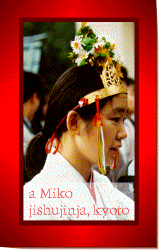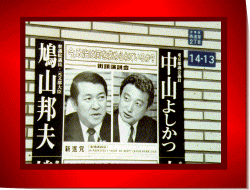
In a society where everyone seems so uncomfortable in public trying to maintain face that I would liken to a young boy visiting some adults that he wants to make a good impression on, television is a welcome exception. Japanese commercials are more entertaining than any commercials in the world, and many of the programs at night are highly entertaining.
Here is a glimpse at one variety show we saw: about eight couples, aged 18-23 years old give a brief description of their relationship. The hosts then cross match the men and women from different couples. Each "swap" couple is given a chance to have a drink and talk together for a brief time while a camera looks on recording all except what is whispered into an ear here and there. Followed by this, the "swap" couples are made to become a little bit more intimate in front of the audience. In one scenario, the man stuck a long chocolate in his mouth and the woman took the other end into hers. They were suppose to eat the chocolate between them, but she broke off her side before his lips met hers. The other scenario had the man biting off a piece of ice that was molded for the purpose. Then he passed the ice onto the woman's mouth with his own. After all this is done, the audience views tape of a hidden interview with the women involved in the "swap". Women say whether or not they would like to swap their mate for the man in the "swap" or stay with their boyfriend instead. If they say they want to swap, they have to walk down some stairs many of which include a television screen facing the foot of her shoes with his face appearing on it.

A woman sat next to me on a crowded bus and began reading a copy of the English language Financial Times. After she had put it away, I asked her where I might be able to purchase a copy. She said that she subscribed to her paper and didn't know where in Kyoto there might be a kiosk to purchase one. Then she added "They don't read English language newspapers. In Tokyo you can only find an English language newspaper in large hotels." [She was partially correct, you can only find USA Today and Japanese English language newspapers at newsstands in Tokyo]. Finally, she added: "They don't even read much Japanese." When I mentioned that I had seen numerous bookstores, but was unsure of the content of the material sold in these stores because I couldn't read Japanese, she said "You didn't miss much."
I wasn't sure where she was from and didn't have a chance to speak with her for long enough to find out why she was so critical of the Japanese people. This was a refreshingly contradictory viewpoint to that carried by Western media reports about Japanese literacy. I have read that more works are translated into Japanese than any language. This alone would suggest that a voracious appetite for reading exists in Japan, but after considering what this woman had said, I took a closer look at what the average, observable Japanese was reading. Businessmen could be seen reading business newspapers, but some could be seen reading Manga (comic books). It was rare to see others reading anything but Manga at all. I doubt that I saw as many people reading books as I am used to seeing do so in similar situations in the U.S. It's dangerous to make a conclusion based on mere observation and discussing the issue with only two people, but I would suggest that the above-average Japanese college student whom I spoke with was more reliable than Western media sources. She agreed with the woman I had met on the bus and generally seemed to have an understanding of the world that supported this despite being a recipient of the Japanese educational system American educators seem to envy so much.


We happened across a Shinto shrine, and I saw a couple of miko (or Shinto Priestesses) so I took some pictures of them. As I walked away to look at some other part of the shrine, one of the mikos approached me. In English, She asked me where I was from so I took the opportunity to ask her a few questions. I spoke to her briefly before she had to officiate at some ceremony, I think it was a wedding, but she later came back and sat with us after changing out of her ceremonial clothes. She said that miko were virginal women who typically served at a Shinto shrine part-time for four years during college, and that they performed wedding ceremonies.

Taking advantage of the fact that I had the opportunity to speak with a Japanese person that could speak English quite well I asked her a few questions about her own opinions and how she viewed the sentiments of other Japanese in a few areas. I told her that I had read that foreigners who were longterm residents of Japan often felt there always existed a wall between themselves and the Japanese that they interacted with from day to day. The way I put it was that it seemed as if Japanese people had difficulty trusting foreigners, even those that had learned enough Japanese to effectively communicate with them. Her response surprised me. She said that Japanese people still feel like they are the victims of World War II because of the bombs dropped on Nagasaki and Hiroshima. Her grandfather was killed somewhere in Southeast Asia during the War and her grandmother lived through the bomb dropped on Hiroshima. She added that younger people like herself want to go past the issues of World War II. When I asked her about the Pacific War and whether or not she felt Japan had some responsibility for it she acknowledged they did. She said that school lessons concerning the issues of responsibility for the Pacific War were not clear. When I asked her how she learned more than was offered in school she didn't have a clear answer, but while we were in Japan we read newspaper articles in Japanese published, English language newspapers that spoke about the continuing debate over Japanese responsibilities for the War and at least one of these articles dealt with the issue of Comfort Women.

When I tried to expand the issue of relations, she told me that she felt younger Japanese were afraid to speak English to foreigners they met, especially in Kyoto where there were a lot of foreign visitors, because they have difficulty in conversational English even though they spend years in school learning it. However, she felt that younger Japanese people were much more interested in other cultures than earlier generations had ever been.
[After having traveled throughout Europe in late Spring where we saw Japanese tourists often outnumber non-European tourists, including a man and woman who were traveling by bicycle, and in Thailand and Malaysia where we saw a young couple, two young women, and a single woman all traveling by themselves it became apparent that Japanese people are beginning to feel more comfortable traveling, even without the ubiquitous Japanese travel group.]


The following news item appeared in the English language Mainichi Daily News on November 25, which was about the time that international headlines were telling of the arrests of former South Korean Presidents Roh Tae Woo and Chun Doo Hwan apparently at the direction of current president, Kim Young Sam, to divert attention from his possible involvement in high level financial scandals:
Shizuoka-- The Shizuoka District Court on Friday upheld the prefecture's argument that it cannot make public the governments' entertainment spending because doing so would harm the confidence of guests entertained at the local governments' expense.

